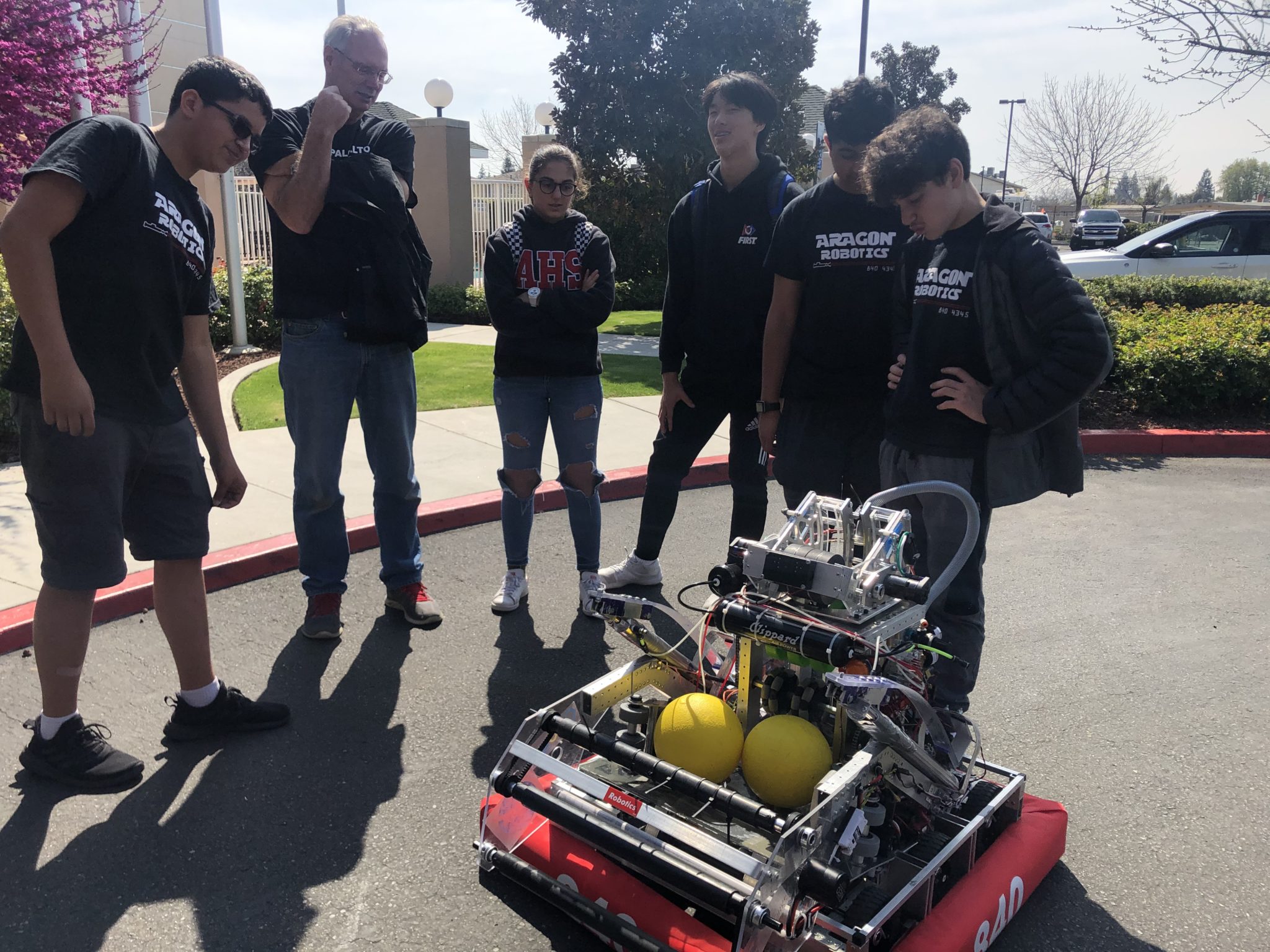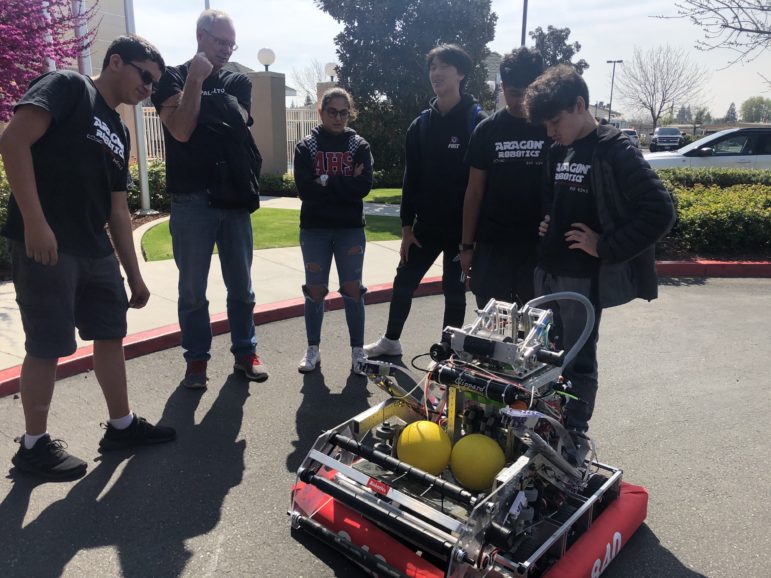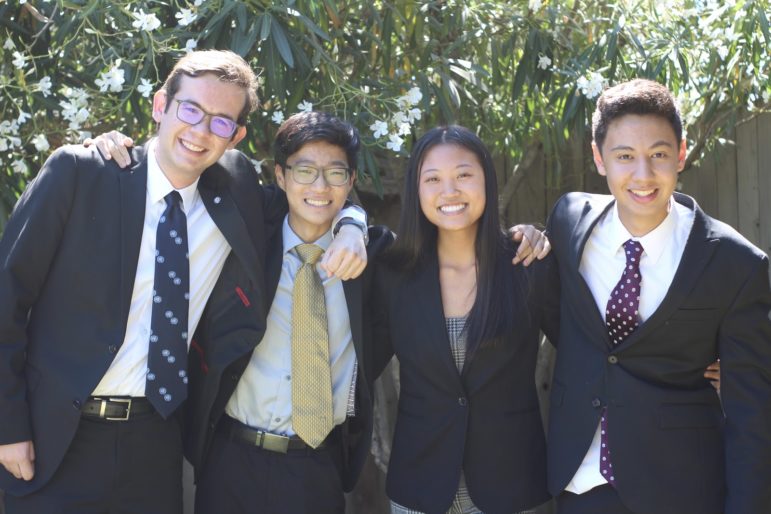
By Peyton De Winter and Audrey Smietana

Aryan Mondkar – Robotics FRC Captain
Why did you decide to join the robotics program?
Last year, I heard that they were adding a new program, and I was interested in mechanical projects before that and so since I heard they were starting the larger FRC team again. I decided to join and I really liked it that year, and did well in the mechanical portion of the team, so I decided to stay on the team again.
What did you prepare for all year?
Basically for the bigger competition, FRC (FIRST Robotics Competition), first semester is training, and second semester is build season, which is six weeks to build your robot. Then you have two competitions, and if you do well, you go to [the World Robot Olympiad]. So, we did our training really well in the first semester, and second semester we built a robot and Corona came around right before our competition. We had built the entire robot, and had actually gone to competition and loaded in all of our gear and robot, they were all in the competition venue, and we went back to the hotel, and went to sleep. The next morning there was an announcement that the competition was canceled.
In your opinion, what is the most enjoyable part of robotics, and did you get the chance to enjoy it this year, despite the virus?
The competition is usually the highlight of robotics, because you get to see your robot out on the field, but we didn’t really get to see that. The thing I really got out of it this year, was that we built a really good bot, and it was better than in past years. We were able to get all of our design goals, and even exceed some of our design goals, rather than in past years. One of our design goals, for example, was to have an entire robot CADded [computer-aided designed], and we were able to hit that this year. So our team did progress a lot.
How many hours did you usually end up putting into robotics a week? Do you regret putting this much time into it?
Keep in mind I was captain, but I was putting in around 35-40 hours a week. I absolutely do not [regret putting this much time into it]. I think I have really got a lot of design experience out of it, I learned a lot. The majority of the learning is done during the build portion, you don’t really learn a lot in competition. It’s more just seeing your robot out on the field. So we got the learning portion out of building the robot and doing training.
How did it feel when your event was canceled due to the virus? How did it affect your routine or life?
Our first competition was March 11-14, and March 13 was the day that we found out that school was canceled, and starting Monday the following week. So, we took all of the competition stuff to my house, where it is now, and I personally have been working, tinkering around with the robot, tweaking it a bit, but we haven’t had team meetings. Apart from online meetings, like Zoom meetings and stuff, I’ve been carrying out the mechanical, actual physical work, and the programmers have been able to work on things remotely. Apart from that, everyone’s kind of doing online work, practicing CAD skills and design skills, looking at how to design and be good at that. So, a lot of the digital stuff we’re still doing. To keep the team together during this time, we’re holding weekly game nights, where we play Rainbow Six Siege, skribbl.io, just other games to keep the team together, make sure everyone has something fun keeping them going during this time. The digital stuff is a lot more creative visual; the only time we go on a call is if leadership or robotics wants to talk about training for next year or something like that. So, we do Zoom meetings with the leads and the mentors, or when someone has a question to ask someone, but apart from that a lot of the learning is done individually.
If you had known about the pandemic before, would you have still joined the robotics program?
Yeah, I still would have joined the robotics program, but if I had known about the pandemic, I think we would have used this year as more of a gap year to just focus on training as a whole because when we pay for registration and our second competition — that’s basically $9000, $5000 for registration and $4000 for the second competition registration. We didn’t get to actually compete, so we could have used that to upgrade our motors, gear or something. Just upgrade the team facilities. So we would have used that money somewhere else. We probably would have built a second bot or explored something our team hasn’t done in the past. I’d just like to reiterate that when we came into competition, we all just really wanted to see the bot on the field, and that’s kind of the first time you know whether your bot will really do well, or completely fail and you need to rebuild over the next two weeks. So, going to sleep, thinking you’re going to find out whether your bot is going to work, and then in the morning, realizing with all the other teams that you’re not going to compete is devastating when you’ve spent so much time working on the bot in the last six weeks.

Florence Ye – Model United Nations President
Why did you join MUN?
When I was in seventh grade, my history teacher told me to join her club, Model UN, saying that I would love it. She was right, of course, and I made a lot of friends through the club. After I moved here during my sophomore year, I joined MUN in hopes of finding friends and [becoming] part of a club that I really enjoyed. Despite being in different high schools, I always had MUN to help me feel like I belonged.
What is your favorite part of MUN?
My favorite part of MUN is obviously the conferences. That’s the only time where I actually get to use my conference preparation and see my speeches and resolution come to life. It’s also a really great time to observe different methods of public speaking and learn from other delegates, which helps me improve my writing and speaking skills.
How long have you been a part of MUN?
I’ve been in MUN for six years now. Each year, I go to at least two conferences, and I spend roughly two weeks preparing for a conference. During conference preparation time, I write my position paper, speeches, resolutions and do a lot of research. This year is different because I had to lead the club. I had to spend extra time planning logistics and club meetings, but I enjoyed putting extra time into the club because the board and past and present MUN advisers made leading the club such an enjoyable experience.
How do you feel about MUN being cancelled due to the coronavirus pandemic?
It’s unfortunate that MUN was cancelled for the rest of this school year. I was looking forward to a lot of things — we were planning to attend Davis MUN, first of all, and I also wanted to say goodbye to the advisers and club members. I was also looking forward to meeting next year’s cabinet and going over MUN logistics with them, but now that will take place over Zoom.
What have you been doing in your free time instead?
I’ve been studying for AP tests, applying for scholarships, cooking and keeping up with school work. I’ve also been watching a lot of shows. My schedule hasn’t changed negatively; I’m getting a lot more sleep now than before, which is nice.
Has MUN continued online?
Before school was closed for the rest of the year, our primary events were Davis MUN and elections. Davis MUN was cancelled, and we conducted elections online through a website called ElectionRunner. After AP testing, the current board will meet up with next year’s board over Zoom and discuss important logistics.
How has being a part of MUN changed you?
MUN has always given me something to be a part of despite being in new and different environments. Some of the brightest, most diligent people I know today were my partners in MUN, and the professionalism, speaking skills and confidence I gained from the club have helped me get opportunities that I otherwise wouldn’t have gotten. I’ve learned a lot about my leadership style this year, and working with my board, club, and adviser was the most pleasant experience of teamwork I’ve had in awhile, which I am very grateful for.
How has being a part of MUN impacted your future plans?
I owe it to MUN for my interest in international relations and for lighting my path towards a career in politics and law. I’ll be majoring in international relations, and I’m looking forward to planning more conferences in college.
Anastasia Yang – Red Cross Club President
Why did you join Red Cross Club?
I joined the Red Cross Club in freshman year because I was really interested in all the opportunities to serve the community and learn a lot of useful skills. My favorite part is being able to get a lot of lifesaving training like CPR, which is really empowering. In addition, I love that the Red Cross is such a large community full of people who just want to make the world a better place.
How long have you been a part of the club?
I’ve been a part of the club for four years! This year, I’ve usually spent around one to two hours per week preparing for meetings, though I do spend a lot more time when we have our monthly liaison meetings or other out-of-school events. What’s really nice is that we decided to have co-presidents this year, so my fellow officers really helped me minimize the workload.
How do you feel about the Red Cross Club being cancelled for the rest of the year?
I’m definitely disappointed that we won’t be able to do a lot of the activities we had planned, especially since I was beginning to have a lot of extra time to organize bigger events, but I’m just glad that everyone is staying safe and healthy.
Have you been continuing the club online?
Yes! Although we don’t send club emails as frequently, we’ve been trying to keep our club Instagram up to date, so members can be aware of all the online events and opportunities hosted by the Youth Executive Board, which oversees all the Red Cross clubs in the Bay Area.
How has the coronavirus pandemic changed the club’s goals?
I don’t think our goals have changed too much, aside from knowing that we can’t set the same expectations as before. We are still working to educate our members and give them access to service opportunities, it’s just that everything is done virtually. For example, we’re currently making e-cards for blood donors, and there was also a really cool course about International Humanitarian Law the other day.
How have you been spending your new free time?
In terms of club, I’ve been attending lots of meetings and webinars to get ideas for virtual activities that we can bring to our club members. In general, though, I’ve been using the free time to get some rest and family time, and just trying to stay occupied with things like reading and playing music.
As a senior, how do you feel about this being your final year in the club?
I’m super sad that I won’t be able to see everyone together one last time! But I want them all to know that I appreciate all the effort they’ve put into our club this year, and I’m really proud of all the work they’ve done.
What has being in the Red Cross Club taught you?
I am certified in CPR/Adult First Aid, as well as Community Disaster Education (CDE) by attending some of the trainings introduced by Red Cross Club, and it’s a nice feeling to know that I can be prepared in an emergency, and that I have the skills to help people in need. I think something that’s often overlooked, though, is the amount of leadership and communication skills that you learn from attending county-wide meetings, or going to Red Cross summer camp and things like that. The experience I’ve gained by contacting supervisors when organizing club meetings is something that will probably help me a lot in the future.
How has being in this club affected your after-high school plans?
Through this club, I’ve learned that I really like learning first aid, which helped me know that going into a health career is probably something I would enjoy!
Kelsey Araghi – Stage Manager for Shakespeare in Love
Why are you a part of the drama program?
I love theater and have always wanted to continue my study of the arts so I joined Aragon Drama.
What did you prepare for all year?
This year we put on two main stage shows. We did Young Frankenstein the Musical in the fall, and were planning on doing Shakespeare in Love this spring. Along with the main stage shows the advanced drama class were going to put on a mini musical and a mini play.
In your opinion, what is the most enjoyable part of what you do in drama? Were you able to do it this year?
Meeting new people is one of the best parts about Aragon Drama because a lot of people audition for shows who aren’t in the drama classes. We work for several months putting in many hours after school and even on weekends to create beautiful productions. While we were able to create the shows, it’s a shame that we weren’t able to share them with the rest of the Aragon community.
How many hours a week did you contribute to drama? Do you regret putting this much time into it? Or was it still fulfilling?
As the stage manager I was in the theater everyday after school, I am the first one there and the last one to leave. I’d say I spend about 15 at least a week working on the show. I don’t regret a single minute of it. Theater is my passion and my future career, and while we didn’t get to put on a performance, we still learned many things and have memories from the rehearsal process.
How do you feel now that your event was forced to cancel due to the virus? Has this impacted your routine or life?
This is the longest amount of time I have spent outside of a theater, and it feels very weird. I am completely devastated that we won’t be able to put on the show, I know how much work every single student involved put in to making this a wonderful show, and it’s upsetting that we don’t get to share it with others.
Has anything else you’ve done been canceled?
The two mini shows the advanced drama class were going to perform have been moved online, along with senior activities and graduation. I am a yearbook editor and it’s disappointing that we aren’t able to have yearbook signing.
How are you spending time you would have put towards the drama program?
I have been doing some self-studying in theater in general and watching old productions that I enjoy or have been apart of.
Are you able to continue what you were doing before online? Or are you doing anything for drama through Zoom, etc.?
The advanced drama students will be putting on Zoom performances, but it isn’t the same and live theater. The Drama awards or “Donnies” have been movies to be on a virtual platform.
Will you be able to compensate for the lost time from the virus in any way?
There were students in the Art of Vídeo class who filmed parts of our rehearsals, so I will be creating a video that does it’s best at capturing the experience that we did have.
If you had known about the pandemic, would you still have decided to join the program? Would you have chosen not to participate?
Theater is my life and I wouldn’t have changed it for the world. I loved every moment spent in the Aragon Theater and will never forget the memories I have from there.
Is there anything you would like to add?
The students that make up the Aragon Drama community are so amazing and have created such a family that I am so grateful to have been a part of. To anyone who has been thinking about joining drama class or auditioning for a show: do it!




